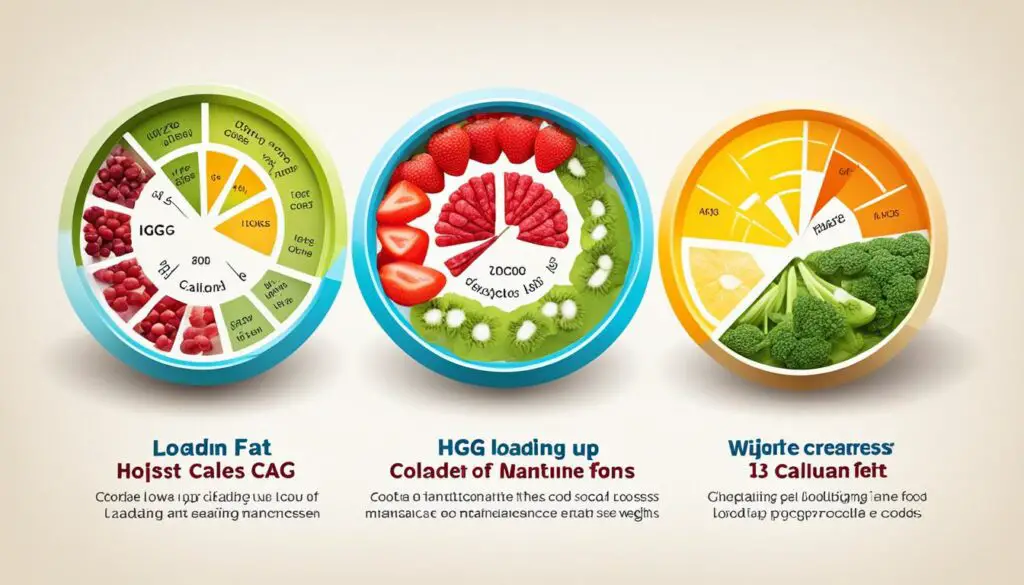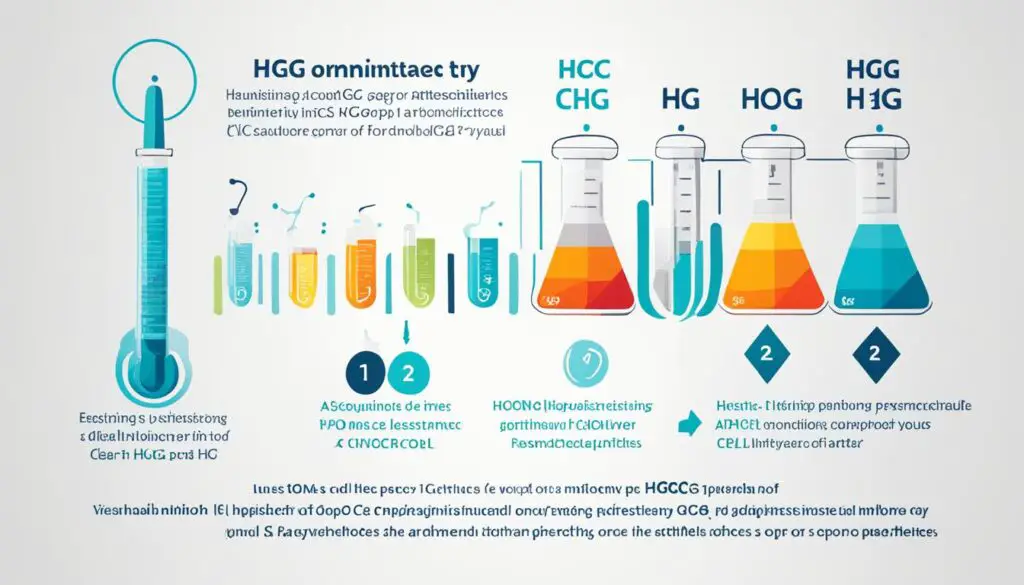Did you know that the HCG Diet, originally developed as a weight loss method for the general population, is becoming increasingly popular among athletes and fitness enthusiasts?
As an athlete myself, I was intrigued by the claims surrounding the HCG Diet and its potential benefits for athletic performance. Could this hormone, typically produced by pregnant women, really help athletes improve their endurance, strength, and overall fitness?
In this article, I will share my personal experience with the HCG Diet as an athlete and explore the potential benefits and risks associated with it. Whether you’re a professional athlete or a fitness enthusiast looking to enhance your athletic performance, this article will provide you with valuable insights into the use of the HCG Diet.
Key Takeaways:
- The HCG Diet is gaining popularity among athletes and fitness enthusiasts for its perceived benefits.
- Personal experience with the HCG Diet can vary, and it’s important to consider individual goals and consult with a healthcare professional.
- The HCG Diet is not a long-term solution and should be followed under proper guidance.
- There are potential risks and side effects associated with the HCG Diet that need to be taken into consideration.
- Exploring safe and effective alternatives is recommended for sustainable weight loss and enhanced athletic performance.
The Controversy Around the HCG Diet
The HCG Diet has become a source of controversy within the medical community, attracting attention from doctors and the media alike. One of the primary points of contention is the stance of the U.S. Food and Drug Administration (FDA) towards the HCG Diet. The FDA does not approve the use of HCG for weight loss purposes and considers it a dangerous and illegal diet method.
Critics of the HCG Diet argue that the weight loss experienced by individuals following this diet is primarily a result of the extremely low-calorie intake, rather than the effects of the hormone itself. The HCG Diet typically restricts daily calorie consumption to just 500 calories, an amount far below the recommended intake for healthy weight loss.
Furthermore, concerns have been raised about the potential side effects of the HCG Diet. These can include malnutrition, muscle loss, electrolyte imbalance, and an increased risk of gallstones. It is important to note that the risks associated with the HCG Diet are not solely attributed to the hormone but also to the severe caloric restriction and potential nutrient deficiencies.
Before embarking on the HCG Diet, it is essential to consult with a healthcare professional who can provide guidance and monitor your progress. They will help you make an informed decision about the potential risks and benefits of the diet, taking into account your specific health needs and goals.
Quote: “The controversy surrounding the HCG Diet stems from the conflicting views on its safety and efficacy. While some proponents swear by its weight loss benefits, critics argue that the risks and potential side effects outweigh any potential benefits.”
It is crucial to approach the HCG Diet with caution and prioritize your overall well-being. Exploring alternative, proven methods for weight loss and improving health may be a safer and more sustainable approach in the long run.
The Dangers of the HCG Diet
The HCG Diet presents several potential dangers and side effects that individuals should be aware of before starting this regimen. Some of the risks associated with the HCG Diet include:
- Malnutrition: The severe calorie restriction can lead to nutrient deficiencies, affecting overall health and well-being.
- Muscle Loss: The low-calorie intake may result in muscle loss, compromising athletic performance and overall strength.
- Electrolyte Imbalance: Imbalanced electrolyte levels can disrupt vital bodily functions, leading to potential health complications.
- Increased Risk of Gallstones: Rapid weight loss can increase the risk of developing gallstones, which can be painful and require medical intervention.
These dangers highlight the importance of considering the potential risks and consulting with a healthcare professional before undertaking the HCG Diet. Careful monitoring and regular check-ups can help mitigate these risks and ensure your safety throughout the diet.
As with any controversial dietary method, it is essential to thoroughly evaluate both the benefits and risks before deciding whether to pursue the HCG Diet.
HCG Diet Side Effects
While individual experiences may vary, there are potential side effects associated with the HCG Diet that individuals should be aware of. Some of these side effects include:
- Depression
- Edema (fluid retention)
- Lack of energy
- Irritability
- Gynecomastia (enlargement of breast tissue in males)
- Restlessness
- Thromboembolism (blood clots)
- Interference with pregnancy test results
These side effects emphasize the importance of a thorough understanding of the potential risks and close monitoring by a healthcare professional. It is vital to ensure that the benefits of the HCG Diet outweigh the potential negative effects on your overall well-being.
The HCG Diet Phases

The HCG Diet follows a structured approach consisting of three distinct phases: the loading phase, weight loss phase, and maintenance phase. Each phase plays a crucial role in achieving weight loss goals and maintaining the results. Let’s explore each phase in detail:
1. Loading Phase:
During the loading phase, individuals are encouraged to indulge in high-calorie and high-fat foods for a period of two days. This phase aims to prepare the body for the upcoming calorie restriction by replenishing glycogen stores and increasing overall calorie intake.
2. Weight Loss Phase:
After the loading phase, individuals enter the weight loss phase. This phase typically lasts between three to six weeks, depending on individual weight loss goals. It involves daily HCG injections or sublingual drops, as well as limiting daily caloric intake to just 500 calories. The combination of HCG and the restrictive diet is believed to facilitate rapid weight loss and fat burning.
3. Maintenance Phase:
Once the weight loss phase is completed, individuals transition to the maintenance phase. The primary goal of this phase is to stabilize the body’s weight and establish healthy eating habits. It involves gradually increasing calorie intake while avoiding sugar and starches. The length of the maintenance phase can vary based on individual goals and progress, but it typically lasts for three weeks to help solidify the weight loss achieved during the previous phase.
This structured approach, consisting of the loading phase, weight loss phase, and maintenance phase, is designed to optimize results and support long-term weight management. Breaks between each phase are recommended to allow the body to adjust and minimize the risk of metabolic adaptation.
Understanding the Effects of HCG on Weight Loss
When it comes to the HCG Diet and weight loss, it’s important to understand that the hormone itself does not directly cause weight loss. Instead, it is the accompanying low-calorie diet that leads to the shedding of pounds. The HCG hormone, or human chorionic gonadotropin, does not have a scientifically proven effect on appetite suppression.
However, individuals following the HCG Diet often report a reduced appetite and hunger levels. This may be attributed to the restrictive nature of the diet, which typically limits caloric intake to 500 calories per day. Such low-calorie consumption can induce a metabolic state known as ketosis, which may contribute to decreased hunger and cravings.
The HCG Diet also emphasizes higher protein intake and restricts carbohydrate consumption. This dietary approach can be effective in reducing the sensation of hunger, as protein-rich foods promote satiety while carbohydrates tend to stimulate appetite.
It is important to note that extreme calorie restriction, as seen in the HCG Diet, can pose various health risks. Such risks include nutrient deficiencies, muscle loss, electrolyte imbalances, and an increased risk of gallstones. Therefore, it is crucial to undertake the HCG Diet under the supervision of a healthcare professional to ensure proper monitoring and minimize potential health complications.
I must emphasize that extreme calorie restriction can be dangerous and should not be undertaken without medical guidance. Always consult with a healthcare professional before embarking on any weight loss program, including the HCG Diet.
Methods of Taking HCG

When it comes to administering HCG, there are several methods available, including sublingual drops, injections, and pills. However, it’s important to understand the differences and effectiveness of each method.
HCG Drops: Sublingual drops, which are placed under the tongue, are a popular choice for HCG administration. However, it’s worth noting that HCG drops are typically ineffective as the hormone is too large to be absorbed through the digestive tract. Therefore, their impact on weight loss may be minimal.
HCG Injections: Injections of HCG, prescribed by a medical professional, are considered one of the most effective and reliable methods. However, it’s crucial to be aware that injections come with potential risks and side effects. Therefore, they should only be administered under the guidance and supervision of a healthcare professional.
HCG Pills: Pills are another option for HCG administration, but their effectiveness is still under debate. Some experts argue that the hormone may not be absorbed properly through the digestive system, which could limit its weight loss benefits.
Homeopathic HCG Remedies: Homeopathic HCG remedies, often found in over-the-counter products, do not contain any active HCG. As a result, they have no effect on weight loss. It’s important to only obtain HCG through a legitimate prescription and avoid using unregulated or ineffective products.
Before deciding on an HCG administration method, it’s crucial to consult with a healthcare professional who can provide guidance and ensure your safety throughout the process.
Pros and Cons of HCG Administration Methods
| Method | Pros | Cons |
|---|---|---|
| HCG Drops | – Convenient and easy to administer – No needles required |
– Ineffective due to poor absorption – Minimal impact on weight loss |
| HCG Injections | – Highly effective and reliable – Prescribed and supervised by a healthcare professional |
– Potential risks and side effects – Requires medical expertise for administration |
| HCG Pills | – Non-invasive method of administration | – Effectiveness still under debate – Limited absorption and potential inefficiency |
| Homeopathic HCG Remedies | – Readily available over-the-counter | – Contain no active HCG – No impact on weight loss |
Risks and Side Effects of the HCG Diet
While the HCG Diet may promise rapid weight loss and increased energy levels, it is important to understand the potential risks and side effects associated with this controversial diet.
Some of the risks and side effects of the HCG Diet include:
- Depression: Some individuals may experience feelings of depression while following the HCG Diet.
- Edema: Edema, or swelling due to fluid retention, can be a side effect of the HCG Diet.
- Lack of Energy: The extremely low-calorie intake of the HCG Diet can lead to a lack of energy and fatigue.
- Irritability: Following the HCG Diet may cause irritability and mood swings.
- Gynecomastia: Male users of HCG may experience gynecomastia, the enlargement of breast tissue.
- Restlessness: Restlessness and difficulty sleeping can be side effects of the HCG Diet.
- Thromboembolism: HCG has been associated with an increased risk of thromboembolism, a potentially life-threatening condition.
- Interference with Pregnancy Test Results: HCG can interfere with the accuracy of pregnancy test results.
In addition to these side effects, the very low-calorie intake of the HCG Diet can lead to deficiencies in vitamins and minerals, an increased risk of gallstones, and muscle loss. It is important to note that individuals with pre-existing conditions such as heart disease, kidney disease, or diabetes may be at higher risk of complications while following the HCG Diet.
To ensure safety, it is recommended to consult with a healthcare professional and be monitored throughout the duration of the HCG Diet.
| Risks and Side Effects of the HCG Diet |
|---|
| Depression |
| Edema |
| Lack of Energy |
| Irritability |
| Gynecomastia |
| Restlessness |
| Thromboembolism |
| Interference with Pregnancy Test Results |
The Legality of HCG Products
When it comes to the legal status of HCG products, there are specific regulations and requirements that individuals need to be aware of. In the United States, the over-the-counter sales of HCG-containing medications are strictly prohibited. This means that you cannot purchase these products without a valid prescription from a healthcare professional.
It’s important to note that this ban also extends to homeopathic HCG products, as they do not contain any active HCG. Despite their availability on the market, these products are not legal for weight loss or any other purpose.
However, there are certain medical conditions for which HCG can be legally prescribed by a healthcare professional. For example, HCG may be prescribed for infertility treatment or other specific medical purposes. It’s crucial to obtain HCG through a legitimate prescription and avoid purchasing illegal or unregulated products.
The FDA, the regulatory authority for medications in the United States, advises against using HCG for weight loss. They have not approved HCG for this purpose and have raised concerns about its safety and effectiveness. Instead, the FDA encourages individuals to seek safer and healthier alternatives for weight loss.
It’s essential to prioritize your health and consult with a healthcare professional before considering any weight loss regimen involving HCG. They can provide guidance, monitor your progress, and help you make informed decisions about your weight loss journey.
Conclusion
After exploring the benefits, controversy, phases, effects, administration methods, risks, side effects, and legality of the HCG Diet, it is clear that this diet requires careful consideration. While some athletes may be drawn to the potential rapid weight loss and increased energy levels, it is crucial to approach the HCG Diet with caution and under the guidance of a healthcare professional.
It is important to remember that the HCG Diet is not a sustainable long-term solution. Instead, it can be used as a jumpstart to weight loss, followed by adopting a balanced and healthy approach to maintaining weight. The restrictive nature of the HCG Diet, with its low-calorie intake, poses potential risks such as nutrient deficiencies, muscle loss, and gallstone formation.
Considering the potential risks and side effects associated with the HCG Diet, it is advisable to explore other safe and effective methods for achieving weight loss and enhancing athletic performance. It is essential to prioritize one’s health and consult with a healthcare professional to determine the most suitable and sustainable approach to reaching fitness goals.
FAQ
What is the HCG Diet?
The HCG Diet involves injecting oneself daily with the hormone HCG, which is produced by pregnant women. Proponents claim that the HCG hormone effectively curbs hunger and allows athletes to subsist on a 500-calorie diet.
What are the benefits of the HCG Diet for athletes?
Some athletes have reported experiencing rapid weight loss and increased energy levels while following the HCG Diet. It is important to note that the HCG Diet is not a sustainable, long-term diet solution and should be followed under the guidance of a healthcare professional.
How long does the HCG Diet last?
The duration of the HCG Diet varies depending on weight loss goals, with breaks between each phase recommended. The diet consists of three phases: the loading phase, weight loss phase, and maintenance phase.
Does the HCG hormone itself cause weight loss?
No, the HCG hormone does not cause weight loss. It is the accompanying low-calorie diet that leads to weight loss. Some individuals may experience reduced hunger on the HCG Diet, likely due to the restrictive diet inducing ketosis and reducing the sensation of hunger.
How is HCG administered?
The most common form of HCG administration is through sublingual drops, although injections and pills are also available. However, HCG drops are typically ineffective as the hormone is too large to be absorbed through the digestive tract.
What are the risks and side effects of the HCG Diet?
The HCG Diet can have several risks and side effects, including malnutrition, muscle loss, electrolyte imbalance, and an increased risk of gallstones. Other potential side effects include depression, edema, lack of energy, and irritability. It is crucial to consult with a healthcare professional before starting the HCG Diet to ensure safety.
Is the HCG Diet legal?
Over-the-counter sales of HCG-containing medications are prohibited in the United States. Homeopathic HCG products, commonly found in over-the-counter products, do not contain any active HCG and have no effect on weight loss. HCG can be legally prescribed by a healthcare professional for certain medical purposes, such as infertility treatment.
What is the conclusion of the HCG Diet for athletes?
While some athletes may experience benefits such as rapid weight loss and increased energy levels on the HCG Diet, it is important to consider the potential risks and side effects before starting the diet. The HCG Diet is not a sustainable long-term solution and should be used as a jumpstart to weight loss, followed by finding a balanced and healthy approach to maintaining weight. It is advisable to explore other safe and effective methods for achieving weight loss and enhancing athletic performance.




